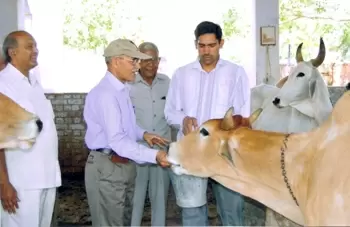“Sterilized and vaccinated dogs cannot be dislocated”

04-October-2011
Vol 2 | Issue 39
"The greatness of a nation and its moral progress can be judged by the way its animals are treated," said Mahatma Gandhi.
World Animal Day is celebrated across the globe on October 4th, the feast of St Francis of Assisi, a nature lover and patron saint of animals and the environment.
In India, the Animal Welfare Board of India (AWBI) takes care of implementation of animal welfare laws in the country. It provides grants to animal welfare organizations and advises the government of India on animal welfare issues.
 |
|
Kharb has been instrumental in the launch of the ongoing ‘Rabies Free India’ programme in many metros in the country
|
Maj. Gen. (Retd.) Dr. R.M. Kharb, is the Chairman of AWBI. Kharb was appointed to the post in recognition of his outstanding contribution in the field of Veterinary Services in the Indian Army.
As Chairman of AWBI, Gen. Kharb successfully convinced the Veterinary Council of India (VCI) to introduce animal welfare as a separate subject in the curriculum of Veterinary Colleges in India.
Kharb has been instrumental in the launch of the ongoing ‘Rabies Free India’ programme in many metros in the country and has also convinced many State governments to adopt the participatory model of Animal Birth Control (ABC) Programme for stray dogs.
He spoke to Rama Devi Menon on protecting animals from cruelty and the laws that can be invoked in case of violations. Excerpts from the interview.
Q. Gen Kharb, we have been witnessing several instances of animal cruelty in our daily lives. We see people beating, kicking and even killing animals, but most of us feel we are helpless to do anything or we just move away feeling sorry for the animal at the most. Are there any laws to protect animals from human torture? Could you highlight some laws that a common man can use to prevent such cruelty towards animals?
A: The two relevant enactments are the Prevention of Cruelty to Animals Act (Section 11), and the Indian Penal Code (Sections 428 & 429). Please always confront the people who may be resorting to unlawful, cruel acts, and lodge complaints with the police, if need be.
Some of the forms of cruelty prescribed under Section 11 of The Prevention of Cruelty to Animals Act, 1960 are beating, kicking, over-riding, over-driving, over-loading, torturing, causing unnecessary pain or suffering to any animal; keeping or confining any animal in any cage or any receptacle, which does not measure sufficiently in height, length and breadth to permit the animal a reasonable opportunity for movement; and mutilating any animal or killing any animal (including stray dogs) by using the method of strychnine injections in the heart or in any other unnecessarily cruel manner.
Q. Can the public make a complaint to the police regarding animal abuse?
A: Yes, indeed. The offences set out in Sections 428 & 429 of the Indian Penal Code, and even some sub-sections of Section 11 of the Prevention of Cruelty to Animals Act, are cognizable. The police can take cognizance of the same. Additionally, the Police Acts of most states contain separate chapters in respect of animal cruelty offences, and prescribe how the same have to be dealt with.
Q. Whom do you approach if the police refuses to take any action?
A: Inform us (the AWBI), or take support from local Animal Welfare Organizations/ Society for Prevention of Cruelty towards Animals/NGOs etc.
Q. Some building societies prevent residents from feeding or sheltering stray dogs even in their apartment basements or in front of the building. How can one overrule such opposition?
A: A building society is not a law enforcement agency, or a body with police powers. It cannot interfere with the rights otherwise available to citizens of India. The Rules, bye-laws, etc. of such an entity cannot differ from, or be more restrictive than any law of the land. Therefore, demand, in the first instance, to see the ‘stipulation’ in the rules or bye-laws of the society, or otherwise contained in their allotment terms, that allows them to debar residents from feeding or sheltering community dogs. If there is such a stipulation, please write to us in the said regard, so that we can take it up with them. If there is none, please stand up for your rights. (However please ensure the sterilization and vaccination of the community animals.)
 |
|
Kharb (wearing a cap) feeding the cows in a Gaushala
|
Q. Can you prevent the municipality from removing vaccinated dogs from a colony?
A: If the dogs are both sterilized and vaccinated, the municipality cannot dislocate them. The Animal Birth Control (Dogs) Rules, 2001, forbid the dislocation of sterilized and vaccinated dogs from the territories they belong to.
Q. Do you have any suggestions for people regarding stray animals in their locality since most consider them a menace? Can you suggest some humane approach?
A: India is the land of ahimsa, and all life is equally sacred. In fact, even the Constitution of India casts a duty upon every citizen to show compassion to all living creatures. This Fundamental Duty is set out in Article 51A (g) of the Constitution of India.
Q. We often see cattle bundled into trucks and being transported from one State to the other without food or water. Can a common man stop the truck and take any action?
A: Complain to the police immediately. Note the number of the vehicle. Complain to the local SPCA / local Animal Welfare Organization. Most of all, lodge a complaint with the police that the animals are/were being transported in violation of the Transport of Animals Rules.
Q. Are sports involving animals like bull fighting, jallikattu and cock fighting banned?
A: Litigation is pending in an effort to try and bring about a ban / adequate safeguard and regulation of such violent entertainment involving cruelty to animals.
Q. During festivals and some religious ceremonies, animals are often sacrificed to appease gods. Is this right?
A: No, it is not right. Around religious beliefs and ceremonies however, we have to tread cautiously. That does not of course mean that any animal can be slaughtered / sacrificed, in the name of religion. Perhaps the persons proposing to sacrifice can be asked to point out the religious text that mandates animal sacrifice as being an essential part of their religion.
Q. Most people are ignorant about the animals that can be kept as pets. Could you tell our readers what are the animals that can be kept at home?
A: The dictionary meaning of the term ‘pet’ is ‘any domesticated or tamed animal that is kept as a companion and cared for affectionately’. If indeed that is the intention, ‘companion animals’, i.e. dogs or cats are best kept as pets. It is also very important to keep in mind that a living being is not chattel, and should be kept without cruelty.
Q. The AWBI has been advocating anti-rabies vaccinations and the animal birth control program for stray dogs. How effective do you think this has been in controlling the population of stray dogs? Do you have any statistics regarding the number of States that have implemented this program?
A: The Animal Birth Control (Dogs) Rules, 2001, mandates that for controlling stray dog population and the spread of rabies, every local authority has to sterilize and vaccinate the dogs in the manner envisaged by the Rules, and put them back at the spot they were picked up from. It can only be effective if area-wise animal birth control is implemented across the length and breadth of the country. Unfortunately, the animal birth control program is not being implemented effectively. However with effective implementation of ABC/AR programme in Chennai and Jaipur, no rabies case has been reported from these two Metros in the last two years and the population of stray dogs has appreciably declined. Therefore, the concept works provided it is implemented aggressively to achieve target of 70% of sterilization and vaccination of dogs.
Q. Finally Gen. Kharb, what is your message to people regarding the need to give a dignified life to animals, especially the homeless?
A: Respect all life and living beings, especially those that are homeless and hence disadvantaged, and show compassion for all living creatures.














